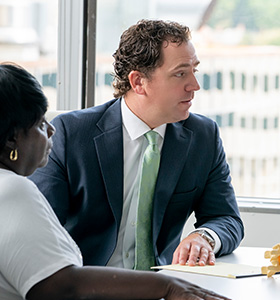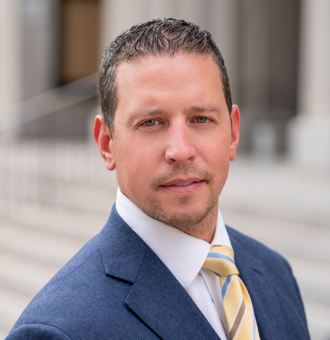Meet St. Louis Criminal Defense Lawyer Gary J. Lauber
 Gary J. Lauber spent the first four years of his legal career prosecuting criminal cases for the St. Louis City Circuit Attorney’s office, gaining a solid foundation in trial experience that has served him ever since.
Gary J. Lauber spent the first four years of his legal career prosecuting criminal cases for the St. Louis City Circuit Attorney’s office, gaining a solid foundation in trial experience that has served him ever since.
“The experience was phenomenal,” he says. “One of the most important things you learn as a prosecutor is the ability to go into a courtroom, pick up a file, and be able to try a case. It’s an amazing skill set that you can’t get anywhere else.”
And it’s benefiting him to this day.
After leaving the prosecutor’s office in 2004, Lauber left to create his own solo practice, continuing to focus on criminal law on the defense side. In 2010 he joined forces with Benjamin J. Sansone and has expanded his practice to include more plaintiff’s personal injury cases.
Gary Lauber Protecting the Rights of St. Louis Citizens
Whether he’s handling a criminal case or civil matter, Lauber believes that there’s nothing as valuable as the basic trial experience that comes from being a prosecuting lawyer.
“Comfort in the courtroom is something you only gain through experience,” he says. “The benefits of being a former prosecutor for a criminal defense attorney are obvious—you learn both sides of the system. But as a lawyer in general, you benefit from learning and attaining skills that you can’t get anywhere else.”
While criminal defense and personal-injury cases are distinctly different kinds of practices, Lauber believes that at one level they are essentially the same.
“People are coming to you and looking for you to help them find a solution. Oftentimes you can’t make the person whole again, but sometimes you can be the guiding presence to get them going in the right direction.”
Practicing Criminal Defense in St. Louis
With clients in criminal cases, he notes, substance abuse or mental-health issues are frequent underlying problems leading to criminal behavior—and when they are, he does what he can to guide them to the help they may need in those areas.
“A lot of times, you’re a counselor—not necessarily a counselor-at-law, but just someone to talk to and give guidance on how to get back on track,” Lauber says.











 Site by Consultwebs.com: Law Firm Website Designers/Personal Injury Lawyer Marketing.
Site by Consultwebs.com: Law Firm Website Designers/Personal Injury Lawyer Marketing.